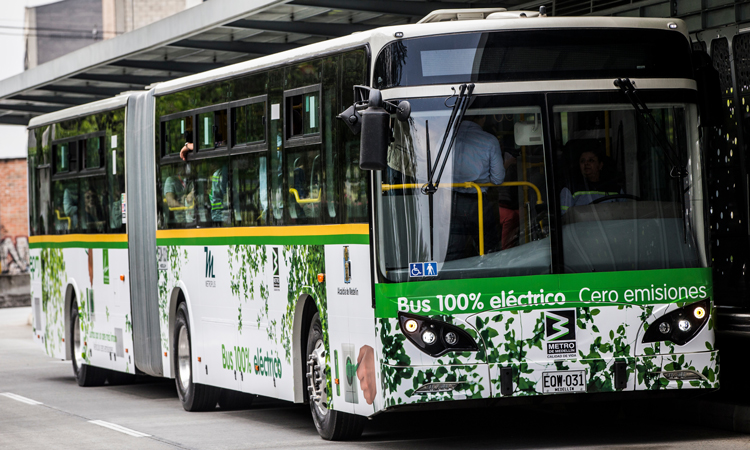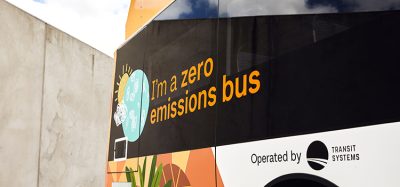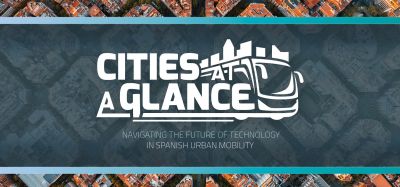$900,000 will be used to increase electric bus deployment in Latin America
- Like
- Digg
- Del
- Tumblr
- VKontakte
- Buffer
- Love This
- Odnoklassniki
- Meneame
- Blogger
- Amazon
- Yahoo Mail
- Gmail
- AOL
- Newsvine
- HackerNews
- Evernote
- MySpace
- Mail.ru
- Viadeo
- Line
- Comments
- Yummly
- SMS
- Viber
- Telegram
- Subscribe
- Skype
- Facebook Messenger
- Kakao
- LiveJournal
- Yammer
- Edgar
- Fintel
- Mix
- Instapaper
- Copy Link
Posted: 22 October 2018 | Intelligent Transport | No comments yet
A new partnership aims to mobilise municipalities whilst deploying electric bus fleets, and will begin with Medellín, São Paulo and Mexico City.


A current electric bus operating in Medellín
A new partnership, led by C40 Cities and the International Council on Clean Transportation (ICCT) and focused on increasing the deployment of zero emission bus fleets in Latin American cities, has been awarded $900,000 in a global competition for innovative sustainability solutions.
The Zero Emission Bus Rapid-deployment Accelerator (ZEBRA) will support all C40 cities and initially intends to work with Medellín, São Paulo and Mexico City in their efforts to plan, finance and deploy electric bus fleets.
Other partners include the World Resources Institute and Centro Mario Molina-Chile, who have been supporting Santiago’s current procurement programme for electric buses. The Inter-American Development Bank will also join as a partner.
“This partnership promises to make the air cleaner for millions of people living and working in some of Latin America’s largest cities, reduce greenhouse gas emissions and provide a valuable roadmap to show how cities can accelerate the deployment of zero emission buses in ways done in China and committed to in California,” said Ian de Cruz, Global Director of Partnering for Green Growth and the Global Goals 2030 (P4G), the initiative that is providing the funding and support to the ZEBRA partnership.
Over the next two years, the ZEBRA partnership seeks to secure commitments from major bus and engine manufacturers to support the growth of electric buses in Latin America through collaboration with cities on vehicle specifications, charging strategies, pilot projects, financing and other steps necessary for fleet-wide deployment of zero emission buses. In addition, it will seek regional financial institutions to commit $1 billion in available financing to replace older diesel buses with electric vehicles.
“Medellín has set the goal of becoming the capital of electric mobility in Latin America,” said Federico Gutiérrez, Mayor of Medellín. “We are convinced that joining the ZEBRA programme will contribute greatly to making this dream come true and will help us build a city that guarantees well-being for its citizens. We are making ambitious efforts to promote sustainable means of transport and therefore we are moving towards the replacement and purchase of electric buses for our BRT – Metroplús system with the firm intention that 100 per cent of the new vehicles enrolled in the system will be electric.”
ZEBRA is one of six partnerships selected by P4G to receive scale-up funding and is among 24 partnerships P4G is facilitating in 2018 following a global competition.
“To deliver on the highest goals of the Paris Agreement and keep global temperature rise within safe limits, requires bold and urgent action. For example, by 2030 every bus on the streets of the world’s biggest cities must be electric,” said Mark Watts, Executive Director, C40 Cities. “This award from P4G and the ZEBRA partnership will help ensure that ambition becomes a reality in cities across Latin America.”
Global demand for electric buses has been growing steadily. Already 26 cities have agreed to C40’s Green & Healthy Streets Declaration, committing to purchase only electric buses from 2025. There are more than 80,000 electric buses on the streets of these cities, demonstrating the huge potential market for manufacturers.
According to the ICCT, buses are just one per cent of all vehicles on the road but 25 per cent of emissions in the transport sector. “Few transit advocates realise more than eight out of 10 new buses sold today do not meet world class vehicle emission standards,” said Drew Kodjak, Executive Director of ICCT. “New buses with dedicated electric drive engines not only deliver zero tailpipe emissions but emit dramatically lower carbon emissions per kilometre and, in most cases, can pay for themselves despite higher upfront cost.”
Related topics
Air Quality, Alternative Power, Fleet Management & Maintenance, Sustainable Urban Transport
Related modes
Bus & Coach, Electric bus
Related cities
Latin America
Related organisations
C40 Cities, International Council on Clean Transportation (ICCT), P4G
Related people
Drew Kodjak, Federico Gutiérrez, Ian de Cruz, Mark Watts








